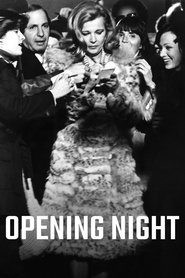We must never forget this is only a play…
Goaded to new heights of unprofessionalism, Myrtle rebels for the duration of the play’s New Haven tryouts. She protests that she has nothing in common with her character, Virginia, all the while fearing that the exact opposite is true. […] “I’m looking for a way to play this part where age doesn’t make any difference,” she announces—an aspiration that, like those of so many other Cassavetes protagonists, is at once crazy, pathetic, and heroic. […] It’s an ingeniously conceived, astonishingly acted part that encapsulates Cassavetes’s assumptions about the function of performance and the value of theatricality in social interaction. […] [Myrtle] is, in a sense, the ultimate Cassavetes character: an actor in revolt, she literalizes the notion of a performance breakdown. […] While Opening Night is often located in the Hollywood tradition of the aging-diva melodrama exemplified by 1950’s All About Eve (Blondell’s role was first offered to Bette Davis), it lacks the genre’s morbid nostalgia and nastiness. With its vertiginous stage/screen refractions, its delight in wrong-footing viewers and engaging their participation, Cassavetes’s film is perhaps closest to the work of Jacques Rivette. […] Curiously, Cassavetes recut Opening Night after its first screening, supposedly because of the overly positive reception.
— Dennis Lim (Criterion)
It’s not for everyone, which in business terms means it’s not for anyone. […] There’s something palpably ghostly about Opening Night’s stark color schemes. […] In an efficiently run universe, Criterion’s beyond crucial set of Cassavetes best films, packaged with informative, alluring extras and lovely A/V transfers, would come with any film-school acceptance letter.
— Chris Cabin (Slant Magazine)
Alcoholics can always tell you about the problems they’re drinking over, but they can never quite see how the boozing and the problems might be related. […] What does this ending mean? Does it celebrate Myrtle’s triumph, that she got through the evening despite being falling-over drunk? Is it a triumph? Will this play ever have another performance? Will Rowlands ever stop drinking? I would love to be able to ask Cassavetes what, exactly, the happy people milling around on stage are happy about.
Synopsis: Actress Myrtle Gordon is a functioning alcoholic who is a few days from the opening night of her latest play, concerning a woman distraught about aging. One night a car kills one of Myrtle's fans who is chasing her limousine in an attempt to get the star's attention. Myrtle internalizes the accident and goes on a spiritual quest, but fails to finds the answers she is after. As opening night inches closer and closer, fragile Myrtle must find a way to make the show go on.

